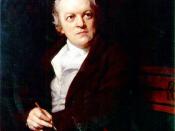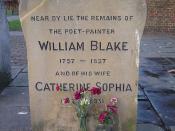During the 18th and 19th centuries, the Industrial Revolution was born in England. With this new growth in industry and capitalism, businessmen recognized the advantage of cheap labor. Children were among the most abused work force in that country's history. William Blake saw this increase of social injustice and was overwhelmed, so he began to write about this hypocrisy of social values that he felt was being carefully hidden from the mainstream. While most considered this unavoidable, child labor was a topic that they did not discuss openly in social groups. Blake wanted to change all of that. As a social critic, he wrote many poems condemning the hypocrisy between these two worlds, for example, "The Chimney Sweeper," "London," and "The Garden of Love." In "London," Blake reveals that this hypocrisy has robbed the world of innocence and spirit. In the first two lines, Blake repeats the word "charter'd."
He uses this repetition to stress the mechanical behavior of the world around him. The word "charter" has connotations of something that can be sold or hired for money. Blake is connecting this idea with the chartered rights of Englishmen given three hundred years ago by the crown and never to be taken away. By using the subject ?street,? and the river ?Thames,? Blake is announcing to the world that this structural society has even corrupted nature. In the next two lines he comments on the beaten men of society: ?. . . every face I meet / Marks of weakness, marks of woe." This behavior is the thief of the individual's innocence as the city of London represents what is manmade: "In every voice, in every ban, / the mind-fog manacles I hear": Blake turns to the root of the problem in the next stanza as he...


